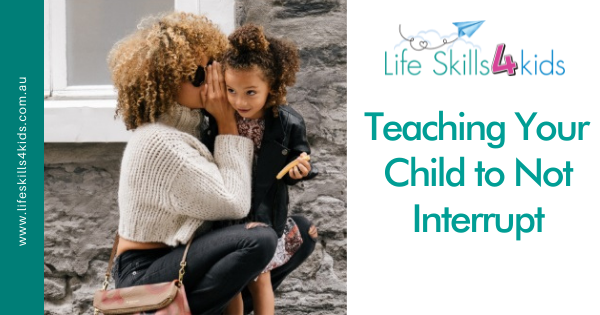Teaching Your Child to Not Interrupt
Written by Deb Hopper
Published in
Great Health Guide articles available in Audio:
As parents, there are many things that we love and adore about our children. There are also some social skills that we seem to teach and re-teach to our kids and we wonder when they will finally learn them. One such skill includes teaching your child to not interrupt when you are speaking to someone else. This is a developmental milestone and a skill that children may need a variety of techniques and strategies to help reinforce and to learn.
CHILDREN MIGHT INTERRUPT CONVERSATIONS FOR SEVERAL REASONS:
1. They don’t realise or forget that other people have needs for attention and feel that they have the most immediate or pressing need.
2. If you have a talkative family who finishes off each other’s sentences, they may be modelling their communication style from adults they know.
3. They may not pick up on social cues and body language that you use when you are busy talking.
It is important to teach children to wait their turn to talk and not interrupt you when you are speaking to others.
HERE ARE THREE TIPS TO TEACH CHILDREN SOCIAL SKILLS TO NOT INTERRUPT WHEN YOU ARE SPEAKING:
1. Teaching social stories and social skills in a variety of ways. As adults, we may not realise the importance of taking the time to explain in a variety of ways the specific social skills, including not interrupting. One very successful way to do this is through creating and using a social story. A social story is a story about a particular social skill that they are struggling with. A social story for not interrupting may go something like this:
‘I love to chat and tell mum and dad (or insert name) about my day and things that are happening to me. There are also times when I feel I really have to say something that’s super important to me’.
‘I know that mum and dad (or another adult) loves me and think that I’m important. But, sometimes they might be talking on the phone or talking to another adult and this is really important to them. They have adult things to organise’.
‘I need to be a big boy/ girl and learn to wait until they have finished talking. I need to learn to notice when they are talking to someone. If they are, I can push my lips together to remind myself that I can wait. I shouldn’t tap them on the arm or say anything as this might be annoying for them. I can wait quietly’.
‘If I forget to not interrupt, that is OK. They will probably tell me to wait. I can then push my lips together and use my thoughts to tell me, ‘It’s OK, I can wait until they are finished talking’. I might go and find something fun to do while I’m waiting, or play with someone’.
You can use this story as a basis for creating your own. Add in some pictures or clip art, especially for younger children or children with additional needs or developmental delay.
2. Use role plays to practice talking together and for your child to wait and practice their strategies.
3. Notice when your child is successful at waiting and give them praise back. This will encourage them to wait again next time.
While it’s important to teach children to wait, as adults we need to learn to be present and not distracted, especially from TV or other screens during peak hours before and after school. If children know that we are available to meet their attention and attachment needs regularly, they will be more able to give us time when we need to speak to others.
_____________________________________________________________
Download your Printable PDF here: SUB 375-JAN-FEB When Kids Interrupt
_____________________________________________________________
Deb Hopper… Occupational Therapist, author, workshop presenter. Deb is passionate about empowering parents and educators to understand the underlying reasons of why children struggle with behaviour, self-esteem and sensory processing difficulties. A practicing Occupational Therapist, she understands the daily struggles that children, parents and teachers face.
Deb is an author and can be contacted via her website.
Deb is the co-author of the CD Sensory Songs for Tots, and author of Reducing Meltdowns and Improving Concentration: The Just Right Kids Technique. The Just Right Kids Technique Model can be downloaded at: https://www.lifeskills4kids.com.au/just-right-kids-model/
You can contact Deb on 02 6555 9877. She is available for clinic and phone/ Skype consultations.


